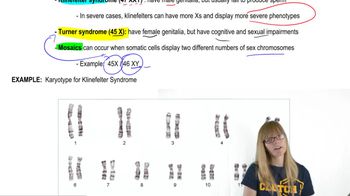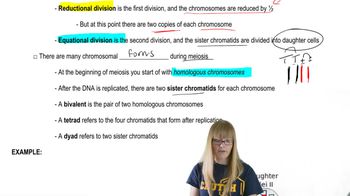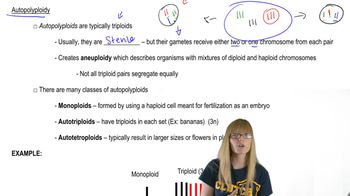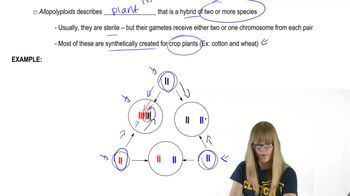Table of contents
- 1. Introduction to Genetics51m
- 2. Mendel's Laws of Inheritance3h 37m
- 3. Extensions to Mendelian Inheritance2h 41m
- 4. Genetic Mapping and Linkage2h 28m
- 5. Genetics of Bacteria and Viruses1h 21m
- 6. Chromosomal Variation1h 48m
- 7. DNA and Chromosome Structure56m
- 8. DNA Replication1h 10m
- 9. Mitosis and Meiosis1h 34m
- 10. Transcription1h 0m
- 11. Translation58m
- 12. Gene Regulation in Prokaryotes1h 19m
- 13. Gene Regulation in Eukaryotes44m
- 14. Genetic Control of Development44m
- 15. Genomes and Genomics1h 50m
- 16. Transposable Elements47m
- 17. Mutation, Repair, and Recombination1h 6m
- 18. Molecular Genetic Tools19m
- 19. Cancer Genetics29m
- 20. Quantitative Genetics1h 26m
- 21. Population Genetics50m
- 22. Evolutionary Genetics29m
6. Chromosomal Variation
Chromosomal Mutations: Aberrant Euploidy
Problem 9c
Textbook Question
Mating between a male donkey (2n=62) and a female horse (2n=64) produces sterile mules. Recently, however, a very rare event occurred—a female mule gave birth to an offspring by mating with a horse.
Determine how many chromosomes are in the mule karyotype, and explain why mules are generally sterile.
 Verified step by step guidance
Verified step by step guidance1
<span>Step 1: Understand the chromosome numbers of the parent species. A male donkey has 62 chromosomes (2n=62), and a female horse has 64 chromosomes (2n=64).</span>
<span>Step 2: Determine the chromosome number in the mule. Mules are hybrids, so they inherit half of their chromosomes from each parent. Calculate the haploid number for each parent: donkey (n=31) and horse (n=32).</span>
<span>Step 3: Add the haploid numbers from each parent to find the mule's chromosome number: 31 (from donkey) + 32 (from horse) = 63 chromosomes in the mule.</span>
<span>Step 4: Explain why mules are generally sterile. Mules have an odd number of chromosomes (63), which leads to problems during meiosis. The chromosomes cannot pair up evenly, resulting in incomplete gametes.</span>
<span>Step 5: Discuss the rare event of a fertile mule. Occasionally, a mule may produce viable gametes due to chromosomal rearrangements or other genetic anomalies, allowing it to reproduce.</span>
Recommended similar problem, with video answer:
 Verified Solution
Verified SolutionThis video solution was recommended by our tutors as helpful for the problem above
Video duration:
1mPlay a video:
Was this helpful?
Key Concepts
Here are the essential concepts you must grasp in order to answer the question correctly.
Chromosome Number and Karyotype
A karyotype is a complete set of chromosomes in an organism, organized by size and shape. In this case, the male donkey has 62 chromosomes and the female horse has 64, resulting in mules typically having 63 chromosomes (2n=63). This odd number of chromosomes complicates meiosis, leading to infertility.
Recommended video:
Guided course

Human Sex Chromosomes
Meiosis and Fertility
Meiosis is the process of cell division that produces gametes (sperm and eggs) with half the chromosome number. For mules, the presence of an odd number of chromosomes (63) disrupts the pairing of homologous chromosomes during meiosis, preventing the formation of viable gametes and resulting in sterility.
Recommended video:
Guided course

Meiosis Overview
Hybrid Vigor and Sterility
Hybrid vigor refers to the enhanced biological qualities that hybrid offspring may exhibit. However, in the case of mules, while they may display hybrid vigor, their sterility arises from the genetic incompatibility between the horse and donkey chromosomes, which prevents successful reproduction in most cases.
Recommended video:
Guided course

Drosophila P Element

 8:42m
8:42mWatch next
Master Aberrant Euploid with a bite sized video explanation from Kylia Goodner
Start learning



